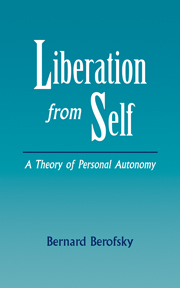Book contents
- Frontmatter
- Contents
- Liberation from self
- 1 Introduction
- 2 Freedom and autonomy
- 3 Freedom of action
- 4 Agent freedom
- 5 Values and the self
- 6 Autonomy and rationality
- 7 Rationality, values, and integrity
- 8 The liberation theory of autonomy: Objectivity
- 9 The liberation theory of autonomy: The place of self
- 10 The value of autonomy
- Notes
- Bibliography
- Index
3 - Freedom of action
Published online by Cambridge University Press: 16 September 2009
- Frontmatter
- Contents
- Liberation from self
- 1 Introduction
- 2 Freedom and autonomy
- 3 Freedom of action
- 4 Agent freedom
- 5 Values and the self
- 6 Autonomy and rationality
- 7 Rationality, values, and integrity
- 8 The liberation theory of autonomy: Objectivity
- 9 The liberation theory of autonomy: The place of self
- 10 The value of autonomy
- Notes
- Bibliography
- Index
Summary
In a sense, we are all free to run four-minute miles. There is no law against it; we all have access to tracks, shorts, and running shoes; we will be neither ostracized nor beaten by our neighbors in the event that we are about to succeed. Insofar as no one is interfering with us, we possess negative freedom. As desirable as this condition is, its shortcomings as a complete account of freedom are conspicuous when we consider how unfair it would be to blame an octogenarian for her failure to reach this goal in spite of her best efforts. In another sense of freedom, positive freedom, the deficiency is internal. In virtue of her inability to run a four-minute mile, she lacks positive freedom to do so and is consequently blameless. With respect to our context, she lacks an essential tool for a display of autonomy as proficiency. We turn first to the idea of ability that is appealed to here.
Ability
Let us begin inside the skin. In one important sense of “free,” to be free to do something, one must be able to do it. Since differences of ability have a lot to do with internal differences among human beings, we may try to characterize ability as an internal state.
- Type
- Chapter
- Information
- Liberation from SelfA Theory of Personal Autonomy, pp. 34 - 56Publisher: Cambridge University PressPrint publication year: 1995



